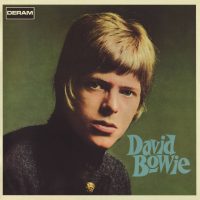 Written by: David Bowie
Written by: David Bowie
Recorded: 12 December 1966
Producer: Mike Vernon
Engineer: Gus Dudgeon
Released: 1 June 1967
David Bowie: vocals
John Renbourn: guitar
Dek Fearnley: bass guitar
Available on:
David Bowie
One of the simplest recordings on David Bowie’s 1967 debut album, ‘Come And Buy My Toys’ features just vocals, acoustic guitar and bass.
The song was recorded at Decca’s north London studios on 12 December 1966. It featured on guitar John Renbourn, with whom Bowie also recorded the unused album track ‘Bunny Thing’ on the same day.
Although many of the songs on David Bowie bore a dark heart at the centre of an outwardly innocent tale, ‘Come And Buy My Toys’ is pure nostalgic joy at the pleasures of childhood. Bowie presents an idyllic picture of youth, a blissful utopia before the toils of adulthood.
You’ve watched your father plough the fields with a ram’s horn
Sowed it wide with peppercorn and furrowed with a bramble thorn
Reaped it with a sharpened scyth, threashed it with a quill
The miller told your father that he’d work it with the greatest will
Now your watching’s over you must play with girls and boys
Leave the parsley on the stalls
Come and buy my toys
John Renbourn founded the folk group Pentangle shortly after recording with Bowie. ‘Come And Buy My Toys’ was a rare excursion into the genre for Bowie, whose acoustic guitar-led recordings tended to owe more to the likes of Dylan than the English folk tradition.
One source of inspiration may have been Simon and Garfunkel, whose album Parsley Sage Rosemary and Thyme had been released in October 1966. A number of words and phrases in ‘Come And Buy My Toys’ also appear in ‘Scarborough Fair’, including ram’s horn, parsley, peppercorn, and cambric shirt.
A more definite antecedent was the poem ‘A Toyman’s Address’, which appeared in volume 42 (1816) of The Monthly Magazine, a London publication to which, at various times, Charles Dickens, William Blake, and Samuel Taylor Coleridge contributed.
‘A Toyman’s Address’ was credited to “G.N.” in the issue, and subtitled “In the style of modern poetry”.
Smiling girls, rosy boys,
Here – come buy my little toys.
Mighty men of gingerbread
Crowd my stall, with faces red
Bowie made some minimal alterations before presenting the lines as his own:
Smiling girls and rosy boys
Come and buy my little toys
Monkeys made of gingerbread
And sugar horses painted red
‘A Toyman’s Address’ was also published in The Lady’s Magazine in 1816, and the opening lines became a traditional nursery rhyme, although how Bowie came to know them is not known.

